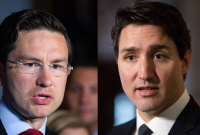Support strong Canadian climate journalism for 2025
Youth activists — some not even old enough to vote — led marches on Parliament Hill Friday, demanding the government do more to address the climate crisis as part of a global day of action.
The marches were organized by Fridays for Future Ottawa and Climat GO (Gatineau-Outaouais). The two groups held rallies at Confederation Park and Maison du Citoyen before marching to Parliament Hill. Indigenous leaders and labour advocates also joined the strike to protest climate inaction and advocate for an intersectional environmental movement that includes their voices.
“The issues of the climate impact everyone … so to be out here is to be working towards your future, to having a future for your friends and family,” Sarah Kohut, organizer for Fridays for Future Ottawa, said.
Fridays for Future Ottawa made several demands at the climate strike, calling for:
- Investments in local renewable energy and affordable electric transit.
- A shift from gas heating to zero-emission heat pumps in Ottawa homes.
- The passage of just transition legislation to help workers navigate a global shift away from fossil fuels.
- An immediate moratorium on new fossil fuel projects, including the Trans Mountain pipeline expansion project and the deepwater oil project Bay du Nord.
Organizers also urged voters to always cast their ballot with climate in mind.
Climat GO had two further demands: massively tax the rich and reinvest that money into social programs to ensure decent conditions for all and ban all fossil fuels by 2030.
Algonquin leaders demand protection for land and water
In front of the lofty Gothic architecture of the Peace Tower, two Algonquin leaders celebrated the demonstrators acting on behalf of the land, waters and future generations.
“I’m out here to speak specifically about the water and how important the water is,” Kyoki Whiteduck, a community member from Kitigan Zibi Anishinabeg and food and climate educator for the Ajashki food security project, said. “Water is life.”
“It’s overlooked here in Canada… People disregard it so much because we have so much,” he added.
Whiteduck’s advocacy comes from the teachings of his grandmother, who was a water keeper in charge of all water ceremonies and advocated for its importance.

“Indigenous rights is environmentalism,” he said, pointing to a desire for First Nations Peoples to have clean water and clean hunting grounds.
For Elder Claudette Commanda, who gave a passionate speech with two eagle feathers and a pouch of tobacco clutched in her hand, the climate is all of creation, including us.
“For me, as an Anishinaabe person, when you say climate, when you say environment, it means the land and all of every creation that’s attached to the land,” Commanda told Canada’s National Observer.
“Nature was the first creation here, so when you destroy nature, you're destroying yourself.”
It’s refreshing for Commanda to see so many non-Indigenous folks advocate not just for the land but also for Indigenous Peoples’ relationship to the land. It’s a change in the environmentalist movement she’s seen in her lifetime.
Years ago, Indigenous Peoples weren’t even included, she said, but now environmentalists are reaching out because they have no choice. Indigenous Peoples’ knowledge and understanding of natural law, given by the Creator, make them an essential voice in the movement, she said.
“[Environmentalists] couldn’t create awareness or make change without our people.”
Important for labour to engage
For Alex Silas, regional executive vice-president of the Public Service Alliance of Canada, labour organizers must put themselves front and centre in the environmental movement. In a speech at Confederation Park, he warned the crowd about bad-faith corporate greenwashing and privatized solutions to the climate crisis.
“As workers, we can’t let the green future be led by the corporate class,” Silas said. “We need to go into a direction grounded on communities, on families and on workers.”
It’s important for labour advocates to remain engaged in the struggle for a green transition to ensure it includes unionized jobs and decent work conditions, he said.
Labour’s organizing power can push for a just transition away from fossil fuels, Silas added.
“If you look at any major progressive change in society throughout history, the labour movement has to be right there,” he said. “This has to be a movement based on people and based on workers.”

Can’t vote, but can speak out
Kaia Thomas, a 17-year-old student at Glebe Collegiate, can’t vote yet, but she can protest on Parliament Hill in front of hundreds of people to make her voice heard.
Not being able to cast a ballot in federal elections “really motivated me to want to speak,” she said.
“I don’t think people understand how dire the situation is. Hopefully, I inspired people to vote for climate, to vote for people who care about these issues.”
Matteo Cimellaro / Local Journalism Initiative / Canada’s National Observer







Comments
I live in Victoria. There was no public demonstration for climate action here. I look at the small crowd in Ottawa. Where is everybody, especially the young people who, as we are told are worried about their future?